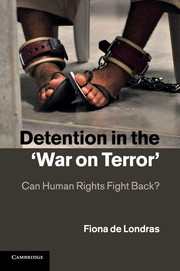Book contents
- Frontmatter
- Contents
- Acknowledgements
- Introduction
- 1 Panic, fear and counter-terrorist law-making
- 2 The right to be free from arbitrary detention
- 3 Counter-terrorist detention: the executive approach
- 4 Legislating for counter-terrorist detention
- 5 International human rights law's resilience in the face of panic
- 6 Judicial responses to counter-terrorist detention: rights-based resistance?
- Conclusion
- Bibliography
- Index
3 - Counter-terrorist detention: the executive approach
Published online by Cambridge University Press: 05 August 2011
- Frontmatter
- Contents
- Acknowledgements
- Introduction
- 1 Panic, fear and counter-terrorist law-making
- 2 The right to be free from arbitrary detention
- 3 Counter-terrorist detention: the executive approach
- 4 Legislating for counter-terrorist detention
- 5 International human rights law's resilience in the face of panic
- 6 Judicial responses to counter-terrorist detention: rights-based resistance?
- Conclusion
- Bibliography
- Index
Summary
Although the US and the UK have taken markedly different executive approaches to the conduct of counter-terrorism operations in the wake of the 11 September 2001 attacks, both have pursued policies that pose profound challenges to the pre-established standards of international human rights law. For both the Bush and Blair Administrations, the detention of suspected terrorists was a central element of their counter-terrorist policies. In both cases there was a commitment not only to a counter-terrorist detention policy but also to a very restrictive system by which this detention could be reviewed. Both administrations represented suspected terrorists as dangerous enough to be detained without charge or trial and too dangerous to be given access to the normal systems and processes of review. As we saw in the previous chapter, limited bases for detention and a substantive review of the lawfulness of detention are the bulwarks protecting liberty against arbitrary deprivation. Although the paradigms within which the US and the UK approached the matter of detention differed significantly (primarily military v. primarily criminal justice), they both posed a severe challenge to these protective mechanisms of human rights law. The approaches of the executive in both states to introducing detention and limiting review can be framed as panic-related by reference to the arguments that were presented in Chapter 1. Not only were panic-related techniques evident in the executives' attempts to introduce desired detention systems domestically but also in their representations to the international community. In Chapter 5 we will examine the response of the international human rights law institutions to these panic-related arguments, but for now it is sufficient to note that they formed part of a transformative effort by the US (in particular) and the UK to influence a downward recalibration of rights-protecting standards in the context of terroristic crisis or emergency. However, there are important distinctions between the approaches that we must acknowledge at the outset.
- Type
- Chapter
- Information
- Detention in the 'War on Terror'Can Human Rights Fight Back?, pp. 72 - 115Publisher: Cambridge University PressPrint publication year: 2011



